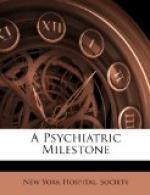A very great number of phenomena observed in neuroses and psychoses are in connection with depression and agitation. Convulsive attacks, diverse fits of agitation, prove to us that before the fit there existed disproportion between the quantity and the tension of the psychological forces, and that the spending of forces during the fit re-establishes the equilibrium. But at the same time, after this spending, one observes a notable lowering of the mental level, a real psycholepsy. It is very likely that studies of this kind will produce some day the key of the epilepsy problem, for vertigos and certain epileptic fits are certainly phenomena of relaxation, the meaning of which we do not comprehend because we do not study sufficiently the state of psychological tension before and after the accidents.
The difficulty of accomplishing superior acts, the exhaustion resulting from their accomplishment, renders them fearful to the patient who has the fear, the phobia of these acts, just as he has the terror of that depression which gives the feeling of the diminution of life. The shrinking of activity and conscience, phobias, negativisms, generally take their starting point in this fear of exhaustion caused by some difficult action. In other cases the patient feels incapable of accomplishing correctly the reflected acts necessary to social and moral life, and feeling no longer protected by reflection, he is afraid of willing or believing something, as one is afraid of walking in a dangerous path, when one cannot see. The vertigo of life produces itself like the vertigo of heights, when one is not sure of oneself.
Depressed patients have felt, wrongly or rightly, a certain excitation after a certain action. Through some curious mechanism, certain acts, instead of exhausting them, have raised their psychological tension. The need, the desire to raise themselves inspires them with the wish to renew such acts, and we behold the impulsions to absorb poisons, impulsions to command, to theft, to aggression, to extraordinary acts, varied impulsions which play a great part in psychoses as well as in neuroses.
I shall not insist any more on a very interesting phenomenon in connection with the oscillations of the mind and which still plays a great part in these diseases. I am speaking of the change of feeling which may accompany the same action in the course of the oscillations of the mind. At the level with the reflected action, more or less complete, the thought of an action which appears important and of which one often thinks, determines interrogations, doubts, scruples. If the individual descends one degree, if he becomes quite incapable of reflecting and therefore of doubting, the same action he continues to think about may present itself under the form of an impulsion more or less irresistible.




